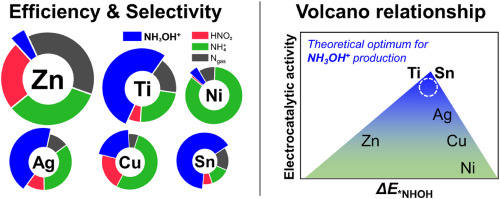Publication
Advanced Redox Technology Lab
Publication
Advanced Redox Technology Lab
Journal papers
Despite the great potential of electrochemical nitrate reduction as a hydroxylamine production method, this strategy has not been sufficiently examined, and the effects of electrode material type on the selectivity and efficiency of this reduction remain underexplored. To bridge this gap, the present study evaluated six metals (Ag, Cu, Ni, Sn, Ti, and Zn) as cathode materials for the electrochemical reduction of nitrate to hydroxylamine, showing that the selectivity of hydroxylamine production was maximal for Sn, while the corresponding faradaic and energy utilization efficiencies were maximal for Ti. Although all tested materials favored nitrate reduction over hydrogen evolution, the disparity in the onset potentials of these reactions did not adequately explain the variations in nitrate removal efficiency, which was found to be influenced by material resistance and charge-transfer properties. The rate constants of elementary nitrate reduction steps determined from the time-dependent concentrations of nitrate and its reduction products (nitrous acid, hydroxylamine, and ammonium) were used to calculate the selectivity and efficiency of hydroxylamine production for each electrode. In turn, these selectivities and efficiencies were correlated with the density functional theory–computed adsorption energies of a key hydroxylamine precursor on different electrodes to afford a volcano-type plot with Ti and Sn at its pinnacle. Thus, this study introduces valuable descriptors and methods for the further screening of electrocatalysts for hydroxylamine generation and the establishment of more environmentally friendly hydroxylamine production techniques utilizing sustainable electricity.
